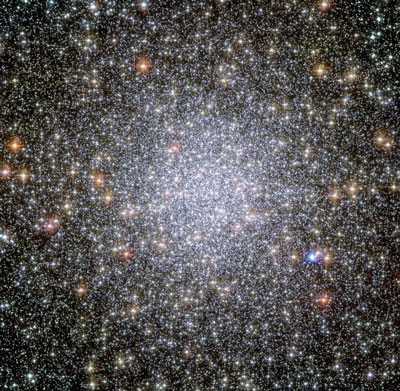 Astronomers using the NASA/ESA Hubble Space Telescope have, for the first time, collected a census of young white dwarf stars beginning their migration from the crowded centre of an ancient star cluster to its less populated outskirts. The new results challenge our ideas about how and when a star loses its mass near the end of its life.
Astronomers using the NASA/ESA Hubble Space Telescope have, for the first time, collected a census of young white dwarf stars beginning their migration from the crowded centre of an ancient star cluster to its less populated outskirts. The new results challenge our ideas about how and when a star loses its mass near the end of its life.
May 14th, 2015
Read more
Researchers want to improve the way unmanned Mars probes detect condensed aromatic carbon, thought to be a chemical signature of astrobiology.
May 14th, 2015
Read more
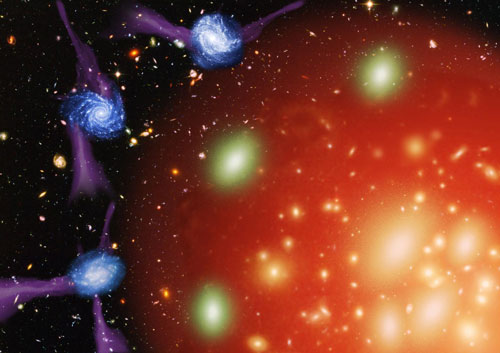 As murder mysteries go, it's a big one: how do galaxies die and what kills them? A new study has found that the primary cause of galactic death is strangulation, which occurs after galaxies are cut off from the raw materials needed to make new stars.
As murder mysteries go, it's a big one: how do galaxies die and what kills them? A new study has found that the primary cause of galactic death is strangulation, which occurs after galaxies are cut off from the raw materials needed to make new stars.
May 14th, 2015
Read more
Researchers discover water vapor may have formed in universe earlier than previously believed.
May 14th, 2015
Read more
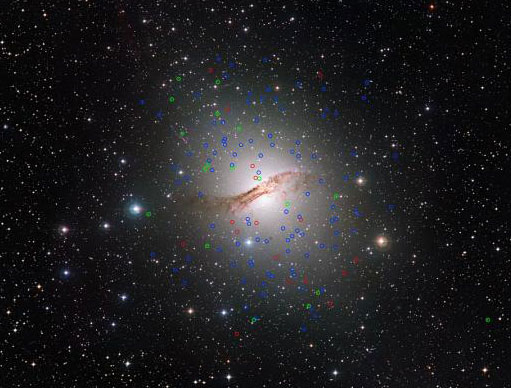 Observations with ESO's Very Large Telescope in Chile have discovered a new class of 'dark' globular star clusters around the giant galaxy Centaurus A. These mysterious objects look similar to normal clusters, but contain much more mass and may either harbor unexpected amounts of dark matter, or contain massive black holes - neither of which was expected nor is understood.
Observations with ESO's Very Large Telescope in Chile have discovered a new class of 'dark' globular star clusters around the giant galaxy Centaurus A. These mysterious objects look similar to normal clusters, but contain much more mass and may either harbor unexpected amounts of dark matter, or contain massive black holes - neither of which was expected nor is understood.
May 13th, 2015
Read more
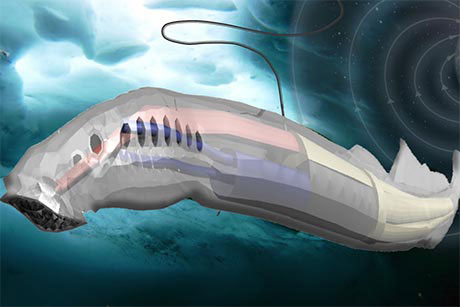 An amphibious robot that can swim through the oceans of distant moons and planets could be the next iteration of self-sustaining, robotic space exploration.
An amphibious robot that can swim through the oceans of distant moons and planets could be the next iteration of self-sustaining, robotic space exploration.
May 13th, 2015
Read more
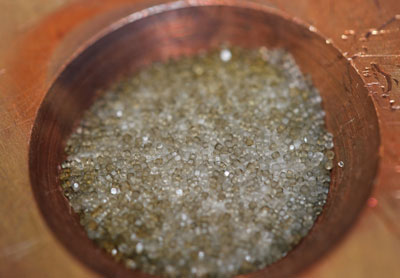 NASA laboratory experiments suggest the dark material coating some geological features of Jupiter's moon Europa is likely sea salt from a subsurface ocean, discolored by exposure to radiation. The presence of sea salt on Europa's surface suggests the ocean is interacting with its rocky seafloor - an important consideration in determining whether the icy moon could support life.
NASA laboratory experiments suggest the dark material coating some geological features of Jupiter's moon Europa is likely sea salt from a subsurface ocean, discolored by exposure to radiation. The presence of sea salt on Europa's surface suggests the ocean is interacting with its rocky seafloor - an important consideration in determining whether the icy moon could support life.
May 12th, 2015
Read more
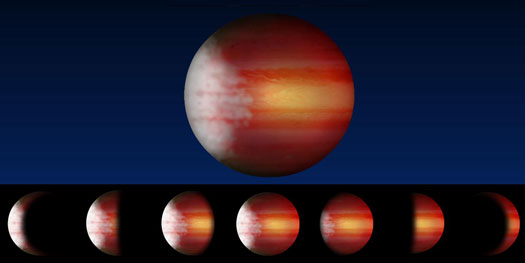 New study uses Kepler data to find evidence of daily weather cycles on exoplanets.
New study uses Kepler data to find evidence of daily weather cycles on exoplanets.
May 12th, 2015
Read more
 Record-smashing new shield creates a large volume with a magnetic field even smaller than that found in the depths of outer space, making certain types of searches for physics beyond the Standard Model possible for the first time.
Record-smashing new shield creates a large volume with a magnetic field even smaller than that found in the depths of outer space, making certain types of searches for physics beyond the Standard Model possible for the first time.
May 12th, 2015
Read more
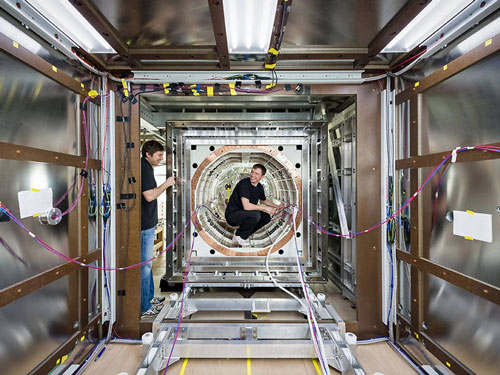 Magnetic fields easily penetrate matter. Creating a space practically devoid of magnetic fields thus presents a great challenge. An international team of physicists has now developed a shielding that dampens low frequency magnetic fields more than a million-fold. Using this mechanism, they have created a space that boasts the weakest magnetic field of our solar system.
Magnetic fields easily penetrate matter. Creating a space practically devoid of magnetic fields thus presents a great challenge. An international team of physicists has now developed a shielding that dampens low frequency magnetic fields more than a million-fold. Using this mechanism, they have created a space that boasts the weakest magnetic field of our solar system.
May 12th, 2015
Read more
NASA has released the agency's 2015 technology roadmaps laying out the promising new technologies that will help NASA achieve its aeronautics, science and human exploration missions for the next 20 years, including the agency's journey to Mars.
May 11th, 2015
Read more
Zero-gravity experiments can tell us a great deal about the effects of temperature change on the concentrations of three different liquids that are mixed together.
May 11th, 2015
Read more
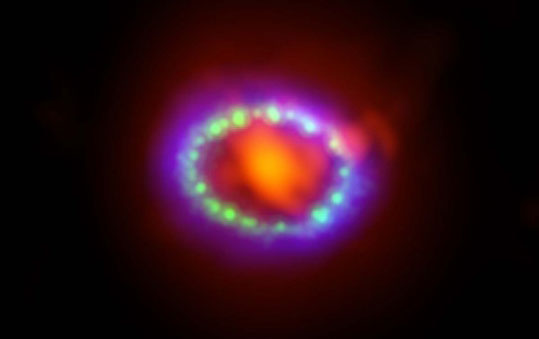 New results from the NASA NuSTAR telescope show that a supernova close to our galaxy experienced a single-sided explosion.
New results from the NASA NuSTAR telescope show that a supernova close to our galaxy experienced a single-sided explosion.
May 9th, 2015
Read more
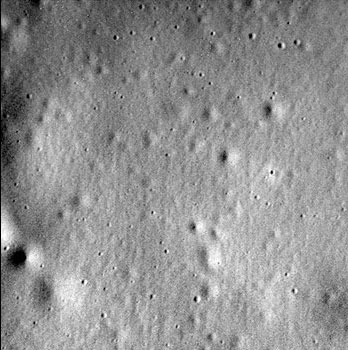 New data from MESSENGER, the spacecraft that orbited Mercury for four years before crashing into the planet a week ago, reveals Mercury's magnetic field is almost four billion years old. The discovery helps scientists piece together the history of Mercury, the closest planet to the sun and one about which we knew very little before MESSENGER.
New data from MESSENGER, the spacecraft that orbited Mercury for four years before crashing into the planet a week ago, reveals Mercury's magnetic field is almost four billion years old. The discovery helps scientists piece together the history of Mercury, the closest planet to the sun and one about which we knew very little before MESSENGER.
May 7th, 2015
Read more
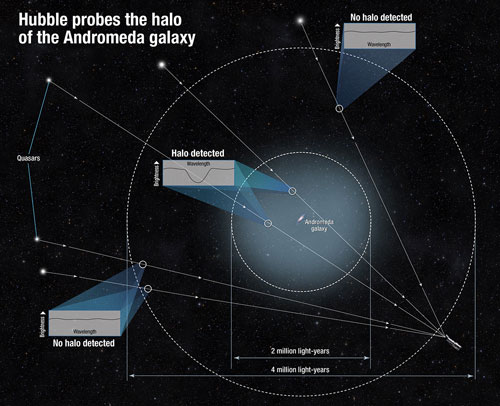 Scientists using NASA's Hubble Space Telescope have discovered that the immense halo of gas enveloping the Andromeda galaxy, our nearest massive galactic neighbor, is about six times larger and 1,000 times more massive than previously measured. The dark, nearly invisible halo stretches about a million light-years from its host galaxy, halfway to our own Milky Way galaxy.
Scientists using NASA's Hubble Space Telescope have discovered that the immense halo of gas enveloping the Andromeda galaxy, our nearest massive galactic neighbor, is about six times larger and 1,000 times more massive than previously measured. The dark, nearly invisible halo stretches about a million light-years from its host galaxy, halfway to our own Milky Way galaxy.
May 7th, 2015
Read more
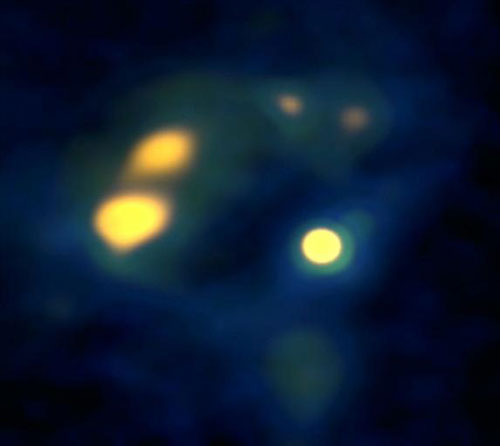 Astronomers using the Atacama Large Millimeter/submillimeter Array (ALMA) have discovered what may be the first known example of a globular cluster about to be born: an incredibly massive, extremely dense, yet star-free cloud of molecular gas.
Astronomers using the Atacama Large Millimeter/submillimeter Array (ALMA) have discovered what may be the first known example of a globular cluster about to be born: an incredibly massive, extremely dense, yet star-free cloud of molecular gas.
May 7th, 2015
Read more
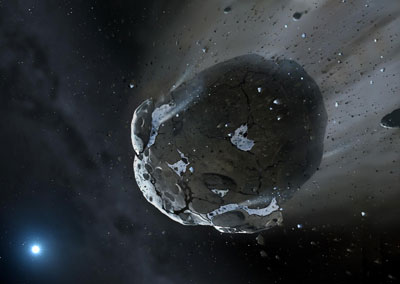 Water delivery via asteroids or comets is likely taking place in many other planetary systems, just as it happened on Earth, new research strongly suggests.
Water delivery via asteroids or comets is likely taking place in many other planetary systems, just as it happened on Earth, new research strongly suggests.
May 7th, 2015
Read more
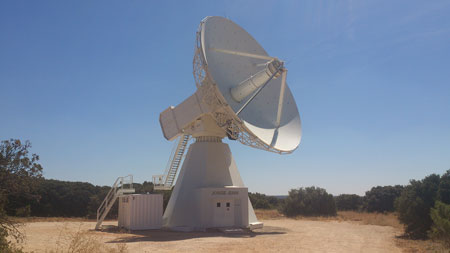 Researchers have developed a very sensitive high frequency amplifier for radio telescopes used on Earth. The amplifier generates extremely little internal electromagnetic noise and will help measure our planet from space more precisely than ever before.
Researchers have developed a very sensitive high frequency amplifier for radio telescopes used on Earth. The amplifier generates extremely little internal electromagnetic noise and will help measure our planet from space more precisely than ever before.
May 6th, 2015
Read more
 Astronomers using the NASA/ESA Hubble Space Telescope have, for the first time, collected a census of young white dwarf stars beginning their migration from the crowded centre of an ancient star cluster to its less populated outskirts. The new results challenge our ideas about how and when a star loses its mass near the end of its life.
Astronomers using the NASA/ESA Hubble Space Telescope have, for the first time, collected a census of young white dwarf stars beginning their migration from the crowded centre of an ancient star cluster to its less populated outskirts. The new results challenge our ideas about how and when a star loses its mass near the end of its life.
 Subscribe to our Space Exploration News feed
Subscribe to our Space Exploration News feed











